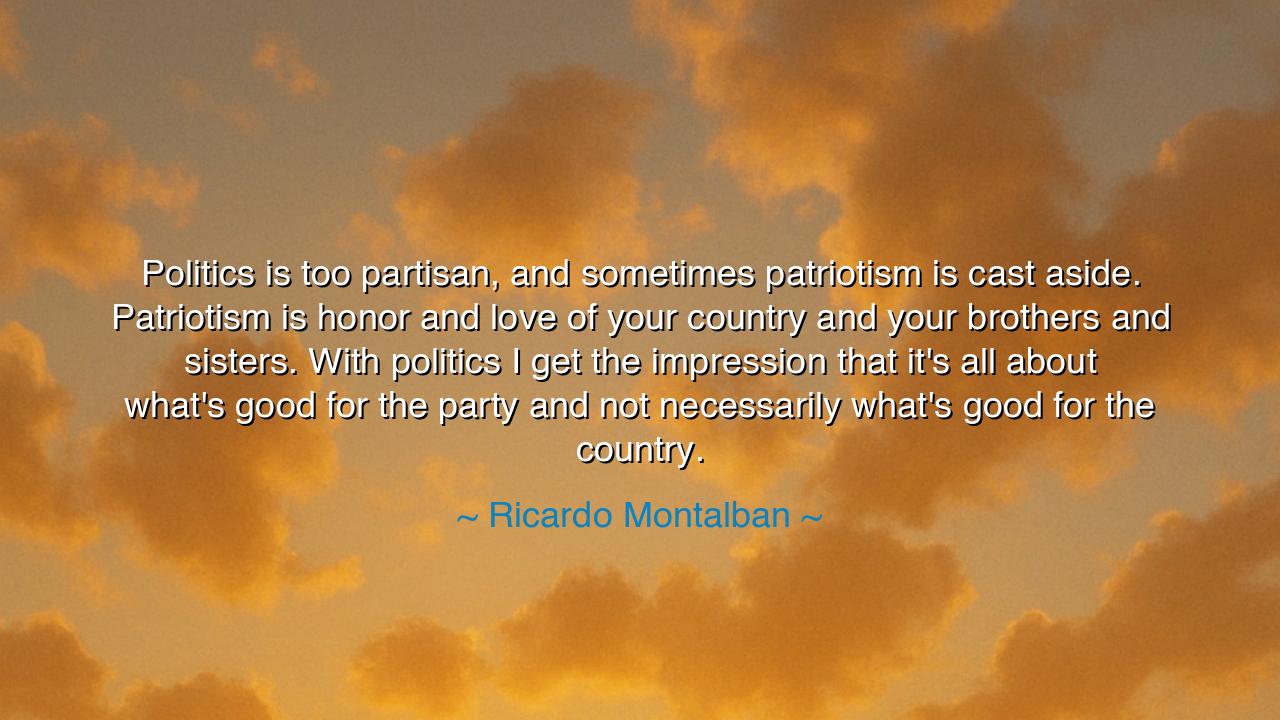
Politics is too partisan, and sometimes patriotism is cast
Politics is too partisan, and sometimes patriotism is cast aside. Patriotism is honor and love of your country and your brothers and sisters. With politics I get the impression that it's all about what's good for the party and not necessarily what's good for the country.






The words of Ricardo Montalban—“Politics is too partisan, and sometimes patriotism is cast aside. Patriotism is honor and love of your country and your brothers and sisters. With politics I get the impression that it’s all about what’s good for the party and not necessarily what’s good for the country.”—are a lament that feels as timeless as the rise and fall of nations. Here Montalban draws a sharp distinction between two forces that often intertwine yet should never be confused. Politics, when consumed by partisanship, divides men into camps that war against one another, caring more for victory than for truth. Patriotism, by contrast, is unity, sacrifice, and devotion to the whole, a sacred bond that binds the citizen not to a faction but to the land and to the people themselves.
The ancients knew this difference well. In Rome, the Senate was meant to govern for the good of the Republic. Yet as partisanship between factions grew, senators ceased to ask, “What is good for Rome?” and instead asked, “What strengthens my party, my power, my purse?” It was this descent into factionalism, this triumph of politics over patriotism, that corroded the Republic and opened the gates to dictatorship. Montalban’s words echo this old truth: when love of country is subordinated to the hunger for party victory, the heart of the nation begins to decay.
He reminds us of the true nature of patriotism: not flags alone, nor hollow chants, but honor and love—the willingness to treat one’s fellow citizens as brothers and sisters, bound by a common destiny. This is not a love of party lines or slogans, but of people, land, and shared struggle. It is a fire that asks not, “How do we defeat our rivals?” but, “How do we raise one another up?” To forget this, to let party blind us to kinship, is to betray the very spirit of the homeland we claim to serve.
History offers us luminous examples. In America, George Washington warned in his farewell address against the rise of partisan politics, knowing that the spirit of faction would divide the republic into warring camps. He called instead for unity, for loyalty to the nation above loyalty to any faction. His life reflected this balance: a general who fought not for party but for the people, a president who stepped away from power so that the republic might endure. Washington embodied the very distinction Montalban raises—the triumph of patriotism over politics.
Yet we also see the darker side. In many ages, factions and parties have been willing to sacrifice the good of the people for temporary gain. Leaders have delayed reforms, obstructed justice, and fanned the flames of division—not because it served the country, but because it served the party. Nations have been torn apart not by foreign armies but by the failure of their leaders to put patriotism before partisanship. The Civil War in America, born from decades of compromise and party-driven paralysis over slavery, is one such searing example. When party interests outweigh the moral call to justice, catastrophe follows.
The meaning of Montalban’s words is thus a call to clarity: love of country is higher than loyalty to party. Patriotism requires sacrifice, humility, and service; politics without patriotism becomes ambition, pride, and conquest. Where parties divide, patriotism unites. Where partisanship feeds discord, patriotism nourishes harmony. Where politics seeks victory, patriotism seeks the good.
The lesson for us is clear and urgent. We must not let partisanship consume us. Do not ask first, “What is good for my side?” but instead, “What is good for my people?” Hold leaders accountable when they place the fortunes of their party above the welfare of their citizens. In our own lives, we too can embody this: choose collaboration over rivalry, truth over victory, compassion over bitterness. Let your patriotism shine in small acts of service, kindness, and integrity.
Thus, Montalban’s words endure as a beacon: nations are not destroyed only by foreign foes, but by citizens who forget that their first allegiance is to one another. Honor your country not by clinging to party lines, but by embracing your brothers and sisters as fellow heirs of a shared destiny. For politics passes, but patriotism—the true, humble love of one’s homeland—remains eternal.






AAdministratorAdministrator
Welcome, honored guests. Please leave a comment, we will respond soon